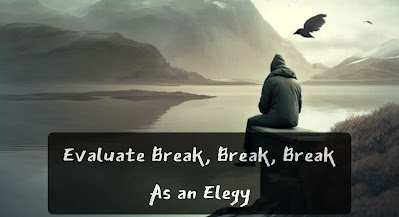Also Read
Break, Break, Break is an elegy which was written to express the poet's grief over the premature death of his friend, Arthur Henry Hallam.
This beautiful elegy sets forth at full length and with ample elaboration the sorrow which this exquisite lyric expresses in quintessence. It is not a spontaneous production of Tennyson but it is more than a mere cry of despair. The poem Break, Break, Break is written in a mood of deep grief, purely a lament on the death of Arthur Henry Hallam. The poet sees the sea-waves darling against the rocky coast, but finds that he is unable fully to express the thoughts and feelings which are rising in him. In a scene, he describes his inner feelings in a very depressive mood; he watches the majestic ships sailing to the harbour for rest, but he misses the company of his friend whose voice has become silent for ever. The sea waves strike against the stones, but the beauty and grace of the days, when the poet's friend was alive, can never come back. He contrasts the moving ships with his friend’s voice which has become silent for ever. And, again he contrasts the wild waves beating against the rocks with the tender beauty of the days of his friendship with Hallam.
A feeling of pathos runs through this brief lyrics. The mood is one of deep sorrow. The poem arouses a corresponding feeling of grief in the heart of the reader. It seems that it comes from the depth of the writer's being. It is a spontaneous expression of grief. The rhythm is anapaestic. Anapaests are usually associated with lightness and speed; Tennyson's anapaests here, are very slow. Apart from the remorseless and hopeless breaking of the sea on the rocks the poem seems content with observation in place of imagery. This is probably its essential meaning; the world is meaningless.
This magnificent elegy must rank for ever among the most poignant elegiac lyrics in the English language. It's simple but pleasant. It signifies Tennyson's most personal and poignant creation. This is the main reason, many critics praised him a lot.
John Pettigrew says: "A deep distress hath humanised my soul, wrote Wordsworth in the elegiac stanzas prompted by the sudden death of his brother. Deep distress humanizes Tennyson's, too, giving, obviously and immediately, the validity of intense personal experience to the eternal note of sadness that had earlier often been artificial, vapid, sentimental; there is nothing 'painted' in, Break, Break, Break, supremely felt, simple, and disciplined, which will forever stand among the world's great laments. Hallam's death not only nourishes Tennyson's elegiac gifts; it also sharpens the opposing forces within the divided sensibility, his grief simultaneously encouraging retreat into solitary brooding, and demanding a need to advance."
